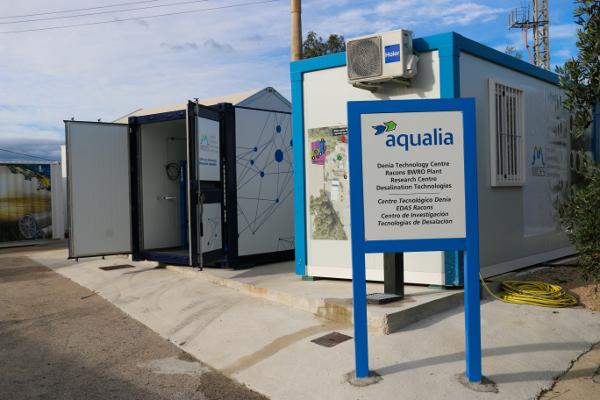
New technology patented to desalinate water without external energy input
The technology, based on the microbial desalination cell, has been developed by Aqualia together with the IMDEA Water institute within the framework of the H2020 MIDES innovation project.
In 2020, Aqualia registered four European patents and one in the United States. With these new registrations, Aqualia now has 14 patents. All of them are focused on the efficient use of water resources.
The first prototypes of microbial cell technology, with a capacity of 3,500 litres/day, are in operation in two facilities managed by Aqualia in Denia (Alicante) and Tenerife.

Aqualia has just obtained a patent in the United States for the microbial desalination cell (MDC) that it has developed together with IMDEA Water as part of the H2020 MIDES. project. This technology, which also received a European patent in 2020, allows desalination without external energy input, using organic matter from wastewater as an energy source. Reducing energy consumption in the desalination process is one of the water management sector's main aims. In this regard, traditional reverse osmosis desalination requires 4 kWh of energy per cubic metre of water.
The first prototypes, with a capacity of 3,500 litres/day, are in operation at two facilities managed by Aqualia in Denia (Alicante) and Tenerife. The first one was commissioned in the summer of 2020 and is powered by brackish water, while the one in Tenerife started operating in early 2021 with seawater. Once each unit has been in operation for a year, there are plans for expansion and deployment in other locations.
In addition, Aqualia obtained three new European patents in 2020 as a result of its research projects with four Spanish universities. This involves the anaerobic membrane reactor (AnMBR) developed with the University of Valencia and Universitat Politècnica de València, which was also protected by an American patent and is implemented in the new LIFE Zero Waste Water project in Valdebebas (Madrid). Together with Canal de Isabel II as a partner, this project aims to demonstrate a new urban water treatment system without external energy input, reducing the carbon footprint and minimising the production of sludge.
The ELSAR, bioelectrochemical reactor was also patented, together with the University of Alcalá (Madrid), which works on a principle similar to the MDC reactor, avoiding the consumption of electrical energy in wastewater treatment.
Lastly, a patent was granted for Advansist, developed by the Rey Juan Carlos University (Madrid), which uses purple bacteria to recover resources from wastewater with minimal environmental impact. The biomass obtained from this process can be used as a raw material in the production of bioplastics, biofertilisers or construction materials.
With these new registrations, Aqualia has now registered fourteen patents. All of them are focused on rethinking formulas and solutions for the efficient management of water resources, placing emphasis on the circularity of the end-to-end water cycle. Frank Rogalla, Aqualia's Head of Innovation and Technology, says "All the processes developed address the challenges of sustainable wastewater treatment and the conversion of treatment plants into biofactories. In this way, Aqualia actively contributes to the fight against the climate emergency by integrating lines of research to recover materials from waste and convert them into by-products that can have a new life".
The use of intellectual property rights accounts for 40% of Spain's GDP and 27% of jobs, according to the EU Intellectual Property Office.




